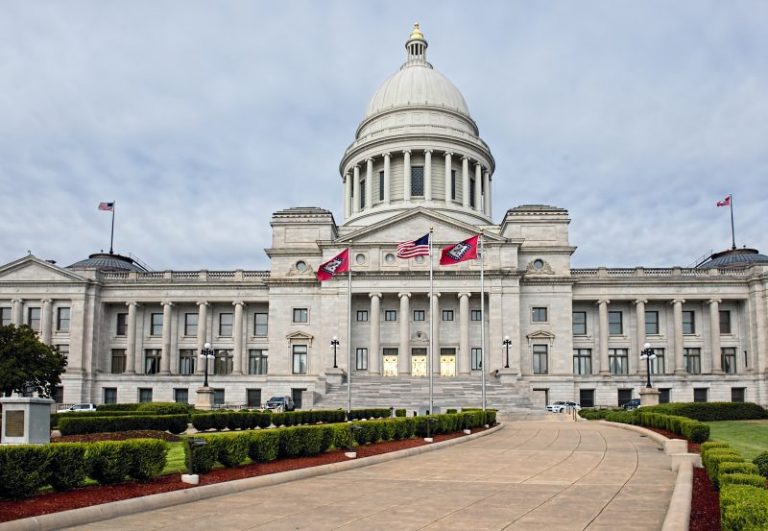Sarah Huckabee Sanders in May told a crowd outside a Dairy Queen in Little Rock that, if elected governor, she wanted “to make sure that the state my kids are growing up in and the state every kid is growing up in is the same one I got to grow up in.”
Barely a month in office, Sanders has already issued an executive order that would prohibit critical race theory in Arkansas schools. Another bans the term “Latinx” in official documents. As soon as this week, she could also sign a separate bill that would impose restrictions on drag shows, which activists said could have far-reaching and harmful effects for the LGBTQ community.
State legislators and Sanders, who was elected in November with 63 percent of the vote, feel “empowered” and that voters have given them a “mandate” to take a side in culture wars, said Heather Yates, a political science professor at the University of Central Arkansas.
Arkansas is among more than a dozen states where legislators have introduced initiatives or signed laws targeting transgender rights, drag shows and the way race is taught in school. Analysts say they are part of a larger conservative effort to push back against a “woke agenda” in an effort to galvanize their conservative base.
The set of orders and bills in Arkansas is meant to send a message to far-right, evangelical, conservative districts and “tell voters that they are taking a stand against immorality and choosing a side in this culture war,” said Eric Reese, Arkansas state manager for the Human Rights Campaign, the nation’s largest LGBTQ advocacy group.
Proponents of the bills argue that they are protecting social values and responding to legitimate concerns from their constituents.
The drag show proposal, first introduced on Jan. 9, is not about “banning anything” but about “protecting kids” from accessing “sexually explicit drag shows,” Alexa Henning, spokeswoman for the Arkansas governor, said in a statement to The Washington Post. “Only in the radical left’s woke dystopia is it not appropriate to protect kids,” Henning added.
But activists say drag shows do not typically involve nudity or stripping, and are not necessarily profane.
Sanders also cited constituents when she signed an executive order to ban the use of the gender-neutral term “Latinx” from state documents, calling it “ethnically insensitive” and “pejorative.”
The term was first popularized in the mid-2000s as a more inclusive alternative by substituting the “o” in “Latino” (which in Spanish is masculine) with the letter “x.” Outside of the LGBTQ communities or liberal academic settings, the term has found little support among Latinos in the United States.
She is not the first politician to put forward such a ban. Last month, Rep. Ruben Gallego (D-Ariz.), who oversaw the Congressional Hispanic Caucus’s campaign fundraising arm last cycle, said his office is not allowed to use “Latinx,” because the term Latinos and Hispanic were already inclusive.
Henning said Sanders based the Arkansas ban on feedback that the governor received from Hispanic leaders in the state and legislature and “took action to remedy.”
Mike Madrid, a GOP consultant based in California, described Sanders’s stance on the term “Latinx” as “pandering” to a small segment of the Latino community, and “political grandstanding.”
More broadly, Madrid argued that the growing number of similar legislation introduced across the country is symptomatic of a reconfiguration of the Republican Party “trying to use government to impose a vision on other people, to engineer society in a way it wants to be.”
In a different executive order, Sanders ordered a review of state education rules and policies to see if any “promote teaching that would indoctrinate students with ideologies such as” critical race theory. Any indoctrination found should be removed, she ordered.
Arkansas’s Division of Elementary and Secondary Education said Friday that it will review the content of the Advanced Placement course on African American studies, in light of Sanders’s order.
Arkansas is following in Florida’s footsteps. Florida’s high school students are restricted from taking the same course, which Gov. Ron DeSantis (R) has argued delves too far into political agendas and introduces topics like queer studies and abolishing prisons.
Texas and Missouri are also considering legislation that establishes new limits or prohibits teaching critical race theory in public schools. Texas has proposed to take away state funds from universities that teach critical race theory.
Mike Gonzalez, a fellow at the Heritage Foundation, argued that the array of legislative efforts are not a partisan issue, but instead a reflection of society fighting against the “efforts to transform the culture of America.”
“This is about people saying, ‘Wait a second, you are saying we should transform everything systematically, that we must overhaul the American system in an absolutist categorical way,’ and society is saying, ‘No, we don’t agree with this,’” Gonzalez said, referring to bans on critical race theory and bills about transgender rights.
Activists worry these bills will further hinder the rights of marginalized groups, creating an environment of fear and tribalism.
This year, for the 2023 legislative sessions, lawmakers in a number of GOP states have introduced 234 anti LGBTQ bills as of Wednesday, according to the ACLU tracker. This weekend, Utah Gov. Spencer Cox (R) signed a bill banning gender-affirming care for transgender youth.
And in Missouri last week, lawmakers debated bills aimed at banning transgender athletes from participating on girls sports teams, prohibiting hospitals and doctors from providing gender-affirming care, and criminalizing the presence of minors at public drag shows, the St. Louis Post-Dispatch reported.
Whether governors will eventually sign the bills and orders or courts later strike them down, is not of large consequence to Republican lawmakers, said Ashley Noel Mack, a professor at Louisiana State University.
“It’s not necessarily about passing along that drag bill, or that CRT initiative, or banning the word Latinx, as much as it is about a type of anti-woke performance,” Mack said. “They want to show their base, ‘Look we are battling the woke police and the social justice warriors.’”

